|
In Oyster Girl, Director Li Xing and Li Jia used a fishing village and oyster farming as background to tell an ordinary oyster girl overcome hardship of a dysfunctional family and social criticism to pursue her love and happiness. Director Li captured the details of everyday life in the small seaside town. Oyster Girl is also a milestone film because it is the first color print developed in Taiwan. Before this film, movie negatives were sent to Japan to develop and make 35 mm prints. Some said Oyster Girl is the first “healthy realism” film completely made in Taiwan. The film won the best film in Asia Film Festival in 1964 and was very successful in the box office. (For more information about director Li Xing, please click here…. ) ~~~~~~~~~~~~~~~~~~~~~~~~~ |



|
Beautiful Duckling is a family drama of a duck farmer who has a lovely adopted daughter. He was tried to keep the adoption a secret but was blackmailed by the brother of this daughter. As it was said in the beginning of the film, duck farming is a very big part of Taiwan economy at the time and a famous Taiwanese painter like to use duck as the theme for his watercolors and Mr. Li was very much like to capture the pastoral life of these farmers on camera. Beautiful Duckling is a fine example of the Gold Age films, with healthy realism characteristics. The film was awarded best director, best actor, and best screenplay at the Taiwan Golden Horse Award, and also had won three awards from the Asia Film Festival in 1965. ~~~~~~~~~~~~~~~~~~~~~~~~~ |
|
Dragon Inn is set in the Ming dynasty. During a power struggle, the loyal minister of defense was wrongly accused by the East Chamber, a Gestapo-like secret service organization serving the emperor, for treason and executed. His children were to be exiled to the remote desert town called Dragon Gate. The head of the East Chamber, Eunuch Tsao, was afraid the children would revenge their father’s death when they grew up. So he ordered the assassination. The loyalists and patriotic swordsmen came to rescue and battle the evil force at the Dragon Inn. Dragon Inn has put the Taiwan cinema on the world cinema map. It has been selected by the Berlin film festival in 1968 and established King Hu as an icon. The year after, Hu made A Touch of Zen which won him the award in Cannes Film Festival. His original fight sequence in the bamboo forest of this film became an instant classic. (For more information on director King Hu, please click here….) ~~~~~~~~~~~~~~~~~~~~~~~~~ |
|
A Summer at Grandpa’s is set in the 60s. Two children were sent to the home of their mother’s parent for the summer vacation in the countryside while their mother is undergo surgery in the city. The boy is about ten or eleven years old and the little girl four or five. For the city boy, the summer in the countryside is filled with excitements exploring what the country could offer, swimming in the river, catching the birds, playing with turtles and climbing the trees. It is also the time he first noticed the adult world is not always as peachy as he thought. Even though this is an early film by director Hou Hsiao-Hsien, his style is already showing. The views of the river and pastoral field along with Smetana’s “My Country” as background music, it honestly captured the environment and the feeling of how it was like growing up in the 60s in Taiwan. ( For more information about director Hou Hsiao-Hsien, please click here….. ) ~~~~~~~~~~~~~~~~~~~~~~~~~ |
|
A City of Sadness is director Hou Hsiao-Hsien’s most famous movie. The film won the Golden Lion award at the 1989 Venice Film Festival. The film is set in the period around the 228 tragic political incident in 1947. The violent conflict caused government reacted fiercely by imposing marshal law in order to regain control and began to arrest and execute any Taiwanese related to the event which created a period so called “White terror” period. Many people vanished overnight and no one knew what happened to them. Director Hou uses this background to depict the disintegration of an ordinary family being the victims of the event and victims of the people from mainland and Hong Kong. The film was made in the late 80s when Taiwan government beginning to loose up the censorship. Because of this was an untouchable theme, it did not sit well with the government at first. Not until it won the Golden Lion award at the Venice Film Festival, the film was allowed to show publicly uncensored. The film feels like a Greek tragedy; bad things happened to the family like inevitable fate not because what they did or did not do. As we watch the youngest brother taking the last family portrait with his camera, he already knew he couldn’t escape the fate that was coming to him, which led us to project tremendous sadness and sympathy to them. And that’s why the film is such a great one. ~~~~~~~~~~~~~~~~~~~~~~~~~ |
|
Three Times or the film’s Chinese title should be translated as “The best of our time”, is director Hou’s more recent film, but it still has the same style and feel of all Hou’s films. Three Times is a trilogy of three unfulfilled love stories in three different time periods - 1966, 1911, and 2005. Again director Hou is examining people and their love in association with different time and places. Hou is marking the progression of time with the way people communicate - the first two stories, letters are the only communication tool, while the third one, it becomes cell-phone calls, text messages, and computer emails. The first two, love was almost unspoken, and in the modern day, sexual intimacy is more free and open. The film was nominated for best film at the Cannes Film Festival. ~~~~~~~~~~~~~~~~~~~~~~~~~ |
|
Cape No. 7 is an independent director Wei Te-Sheng’s first feature movie. who had overcome all obstacles and financial difficulties to realize his vision on the screen. The film begins with a disappointed singer, after he failed to make a name in the big city, decides to go home and abandon his dream. Home is a small seaside town at the south most tip of the island. He finds a temporary job as mail carrier when the mailman Mao-Pei broke his leg by driving his motorcycle into the ditch. From the mails he supposed to deliver, the singer finds a package of love letters with an old address “Cape No. 7” that is no longer existed in the current date. Meanwhile the singer is recruited to lead a local warm up band for a concert of a famous Japanese singer. A band is formed in the community with most unlikely to succeed group of characters from old mailman, a middle-age police officer, a wine salesman, to a young girl who glues to the iPad earphone at all time. Director Wei threads all these characters and humors with the mystery of the love letters which were read over the length of the film by an incredible, sexy baritone voice to reveal a tragedy unfulfilled love story that happened at Cape No. 7 some sixty year ago. The film owes its success to a well constructed plot and excellent performances. It set the box office record in Taiwan’s Chinese Language film history by surpassing the success of “Police story 3 Super Cop” by Jackie Chen, and it is the second highest box office hit for all movies in Taiwan right behind “Titanic”. It won 6 Golden Horse awards, including “The Outstanding Taiwanese Film of the Year”, “The Outstanding Taiwanese Filmmaker of the Year (Wei Te-Sheng)” and numerous other nominations internationally. It was the official entry for the 2009 Academy Award for Taiwan. ~~~~~~~~~~~~~~~~~~~~~~~~~ |
|
Island Etude is a Taiwanese version of Motorcycle Diary. The film follows a hearing impaired college student taking a seven-day of bike trip around the coast line of the island. This is the directorial debut of the famous cinematographer Huai-en Chen who was the cinematographer for Hou Hsiao-Hsien’s A City of Sadness and Good men, Good women. The film not only captures the beauty of the island, but also gives snapshots of the modern day Taiwan through characters his encountered during the trip. The film is Taiwan’s official entry to Oscar Academy Award of 2008. ~~~~~~~~~~~~~~~~~~~~~~~~~ |
|
Orz Boyz is a charming coming of age movie about two boys, Liar No. 1 and Liar No. 2, concocting innocence mischief after mischief in school and around the neighborhood in order to escape the harsh reality of their lives. Liar No. 1 is from a broken family where his mother either left or died when he was young and his father had mental breakdown due to the broken heart. Liar No. 2 is abandoned by his parent and forced to live with his grandmother who really does not welcome him. They create their own imaginary world and fairytales. They truly believe that if they go down the water slide a hundred times, they can be ejected to a different dimension and become adults. When they start to save money for the water park, it puts their friendship and trust into test. The excellent performance by the two boys and supporting actors make the film worth viewing. This is a directorial debut of writer/director Yang Ya-che. ~~~~~~~~~~~~~~~~~~~~~~~~~ |
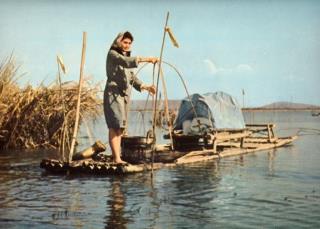
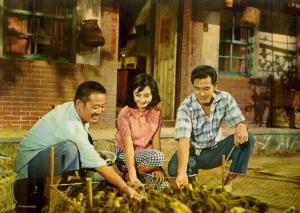

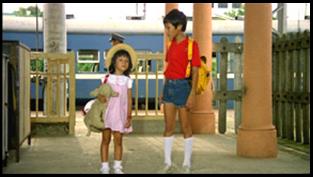

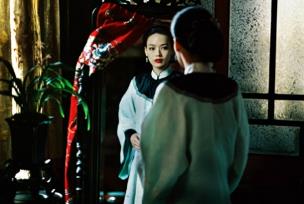
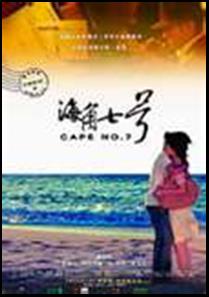

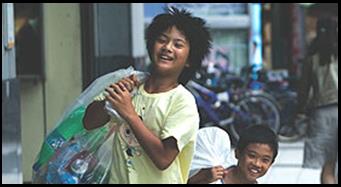

|
( For Film Schedule , please click here ….. ) |



|
[ Home ] [ Archived Events ] © Copyright Hanlin Chinese Culture Association, Hockessin, DE 19711 |